#latinx queer inclusion
Explore tagged Tumblr posts
Photo
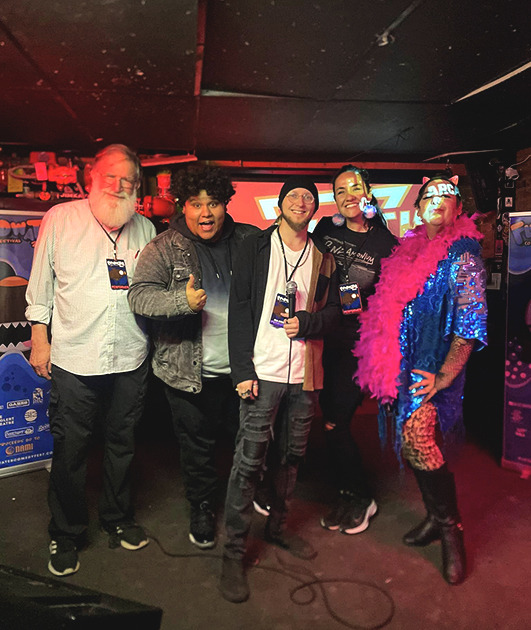
Thank you, Iowa City
The 2023 Floodwater Comedy Festival in Iowa City was an exhilarating experience! I enjoyed connecting with laugh makers from around the country and catching their sets. Huge thank you to Travis Coltrain, Karen Sanchez Dougall, Logan Pratt, and Luke and Lindsey Brooks for all the selfless work they did to make this comeback event a success. I'm grateful for the wonderful and talented friends I made this weekend. I also had a front-row ticket to see our headliner Heather Land, who put on a Broadway-caliber show at the historic Englert Theatre. Everything happens within just a few days with festivals like this so today I'm replaying the hilarious moments in my head, happy to have been a part of such a spectacular event. Until next time, my funny friends.
#floodwater comedy festival 2023#iowa city#iowa#comedy#jade esteban estrada#the prada enchilada#getjaded#funny#bravo#comedy central#comedian#stand up comedy#stand up comedians#comedy festival#queer latinx#inclusive#heather land#stand up comic#gay comedy#queer comedy#queer comedian#gay comedian#kentucky colonel#first gay latin star#college speaker#singer#parody singer
0 notes
Text

Cornfield comedy
The 2023 Floodwater Comedy Festival in Iowa City was an exhilarating experience! I enjoyed connecting with laugh makers from around the country and catching their sets. Huge thank you to Travis Coltrain, Karen Sanchez Dougall, Logan Pratt, and Luke and Lindsey Brooks for all the selfless work they did to make this comeback event a success. I'm grateful for the wonderful and talented friends I made this weekend. I also had a front-row ticket to see our headliner Heather Land, who put on a Broadway-caliber show at the historic Englert Theatre. Everything happens within just a few days with festivals like this so today I'm replaying the hilarious moments in my head, happy to have been a part of such a spectacular event. Until next time, my funny friends.
#floodwater comedy festival 2023#iowa city#iowa#jade esteban estrada#the prada enchilada#comedy#comedy festival#comedian#stand up comedy#lgbtqia#inclusive#funny#comedy night#joystick comedy bar#comedy tour#jade in america#jade in america comedy tour#queer latinx#getjaded#entertainment#jokes#gay comedy#queer comedy#queer comedian#gay comedian#post show#drag comedy#lgbtqia comedy#lgbtq comedy#lgbtq comedian
0 notes
Text
Adding a screenshot of their tags but will also use them to tag this myself for those with screen-readers:

Heard and noted, bean. Thank you for this addition!! I genuinely appreciate it 💛
And I promise I'm not tryna be rude, but I'm not sure if you're aware of this yet. I and other Black people, especially nonbinary Black people, would appreciate it if you could please try to move away from saying "NB" for nonbinary. NB was originally coined by Black people to mean "non-Black." And it's used to differentiate between us and non-Blacks and the types of discrimination we face. Black people have been asking others to not use NB to mean "nonbinary" because it's appropriative of our language and causes confusion when we say things like NBPoC. So please, try to start using alternatives for NB; "enby" and "nonbi" seem to be the most popular right now. Also, please avoid alternatives that are basically NB with something tacked on, such as "NBi" or "gNB." Sorry if this is bothersome!!
Dear Cis People,
Stop saying "folx." Stop saying "womxn" and "mxn." Stop saying "Latinx." Stop trying to be gender inclusive like this and attempting to make words gender neutral in the worst way possible.
Stop adding an "X" to words that are already inclusive of everyone, such as "folks"!
Stop adding "X" to words that don't need it because, newsflash, nonbinary people ARE NOT binary trans people! We are not binary men and women. We have terms like AFAB and AMAB to use instead of forcibly being lumped together with binary men and women! You wanna talk about women and AFAB enbies? SAY THAT! You wanna talk about men and AMAB enbies? SAY THAT! But please stop including us all together all the time!
Stop anglicizing languages like Spanish to make them gender neutral when there are better options, like saying "LatinE" or "Latin." And options like using an "E" instead of an "X" to neutralize gendered terms! Stop using an X when it literally doesn't make sense and is hard to pronounce anyway!
I get it; some of you wanna be inclusive of everyone. But this ain't it. It really is not. This isn't helping anyone and is so unnecessary. It is performative and, honestly, racist and transphobic/enbyphobic, whether it's intended or not. Please stop!! And PLEASE talk to actual nonbinary people on how to be gender inclusive towards us instead!!
#lenguaje inclusivo#inclusive language#just use latine it's easier#but don't get surprised when u see latines using X#and don't use it as an excuse not to use E#also we may use it in English spaces just to avoid explaining why the use of E#replies#excellent addition#queer education#lgbtq+#nonbinary#enby#latinx#gender neutral#gender inclusive#gender neutral language#gender neutral terms#queer terminology#trans#transgender
169 notes
·
View notes
Text
10/02-03/2024 Daily OFMD Recap
TLDR; David Jenkins; Rhys Darby; Taika Waititi; Samba Schutte; Kristian Nairn; Rachel House; Vico Ortiz; Anapela Polatavaio & David Fane; Lindsey Cantrell; Dominic Burgess; OFMD Rewind/Lube As a Crew; Fan Spotlight: Never Left Podcast; Gay Pirate News Hour; Love Notes;
Hey crew! It's gonna be another day of catching up because wow- lots happened, and lots of life has happened to! Will do my best to get 10/04 up with catch up stuff as well tonight!
== David Jenkins ==
David is promoting Kristian's book! Simone is helping!


Source: David's Instagram
== Rhys Darby ==
Although these are from last year, they were just posted by Gabe Ross, so here they are!


Source: Gabeross42 instagram
More pics to come from the Largo Los Angeles "Rhys Darby Saying Funny Things Society" show that happened on the 10/01! You can actually see some extra stuff from the show on Rhys' Substack!

Source: Largo Los Angelos Instagram
== Taika Waititi ==
Wanna see a video of Taika participating in the Haka World Record? Check it out over on tiktok!
Source: Cristalmkt on Tiktok
Taika posted the new trailer for the latest season of WWDITS!
instagram
Source: Taika's Instagram
== Kristian Nairn ==
Kristian was out at Forbidden Planet doing signings! Did you get a chance to go?



Source: Kristian Nairn's Instagram
== Samba Schutte ==
Samba is going to be joining the team of Legend of Vox Machina for season 3!


Source: Samba's Instagram Oh and remember Best Life? It won 3 Awards of Merit from the Best Shorts Competition!



Source: Valerie Chaney's Instagram
Heyy! Good news, Advanced Chemistry is coming out on 10/8 on digital!
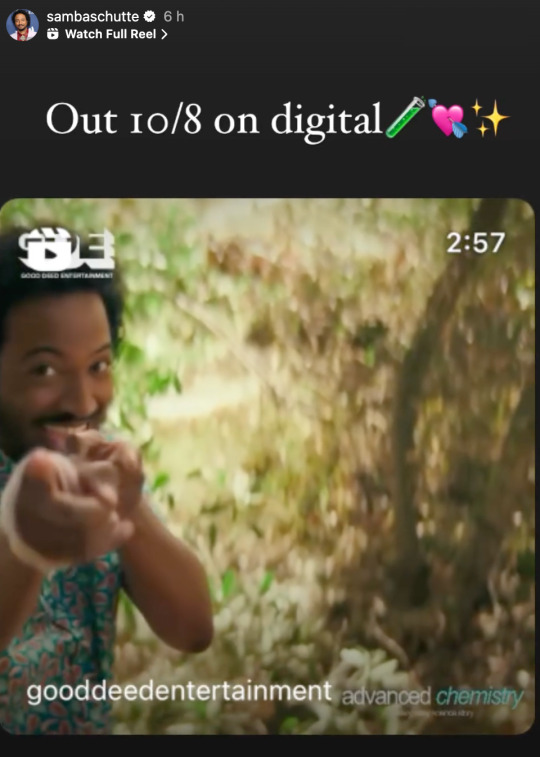
Source: Samba's Instagram Stories
== Anapela Polataivao & David Fane ==
Anapela's new movie Tina premiered in Hawai'i on 10/03/2024! Lots of pics of the cast at the premier!






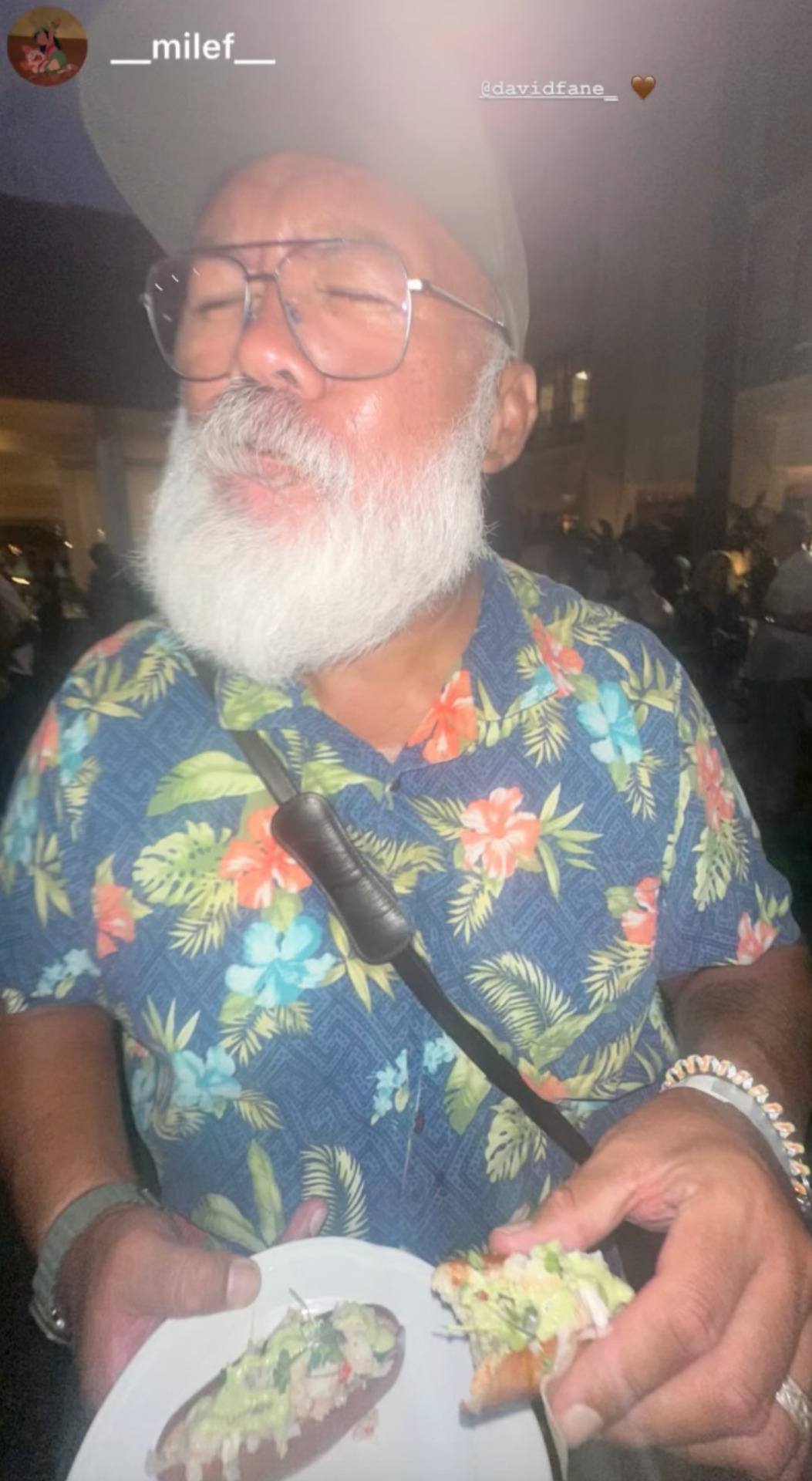
Source: Tina The Film Instagram / David Fane's Instagram Stories
== Vico Ortiz ==
Vico participated in the ActNOW's September Scene Study class (Justice for my Sister Fellowship) and helped the next generation of folks learn about "inclusive and trauma informed filmmaking for radical, authentic storytelling"!


Source: Instagram
Vico's voiced a new Audio book thats available now! Jasmine is Haunted is available at your local library and anywhere Audiobooks are sold!
"Jasmine Garza has a problem... and it’s not just the ghost that’s been haunting her for years! 👻 Perfect for any young listener who loves Ghostbusters, this queer, #LatinX paranormal fantasy is a fun and thrilling ghost hunting adventure perfect for spooky season. Available now everywhere #audiobooks are sold and at your local library with @hoopla.digital and @libbyapp! ✨🎧"
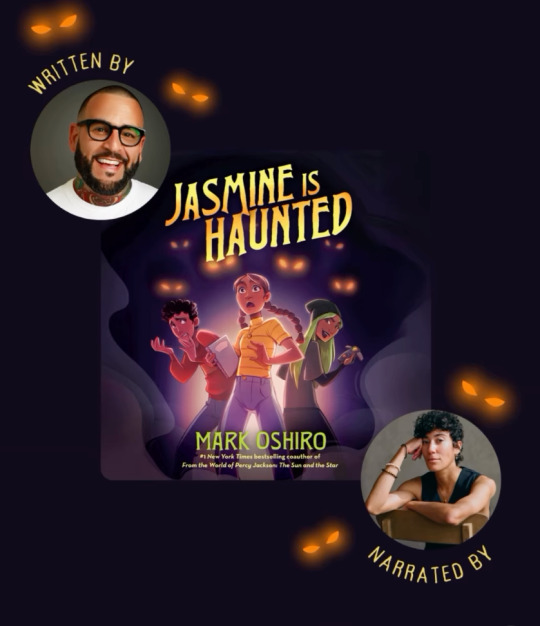
Source: Dreamscape Media Instagram
== Dominic Burgess ==
Dominic knows all too well how to get my attention. More Cat content.
Source: Dominic Burgess Twitter
== Rachel House ==
Rachel's film Te Maunga (The Mountain) was awarded the CIFEJ Award at the Schlingel Film Festival! Oh - and Correction, The Mountain movie was available 10/02/24 on digital in AoNZ and AUS. It's not available yet int the US. Sorry about the confusion!
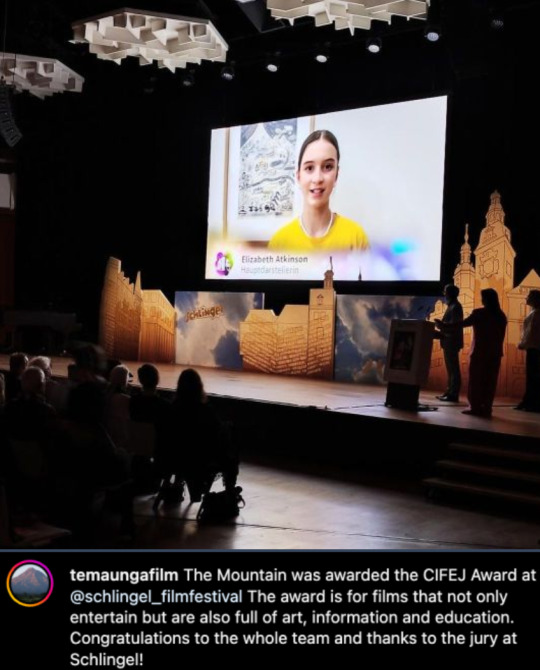
Source: Rachel's Instagram
Another shot of Rachel at Tiff!

Source: birdrunningh2o Instagram
== Lindsey Cantrell ==
Our dear Set Designer Linds Cantrell shared some shots of a bakery in Auckland. Now-- is she clearing out her phone, or is there more to it? You decide :)

Source: Linds Cantrell Instagram
== OFMD Rewind ==
Our friends over at @adoptourcrew and @astroglideofficial kept the OFMD Rewind Watch Party going on the 3rd, and got it trending! Wanna see the tweet thread and have access to twitter? Visit them here! If you don't have access to twitter and want to see it, visit the Renewal Repo!
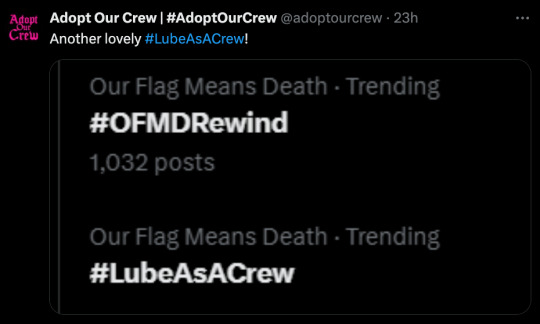
Source: Adopt Our Crew Twitter
== Fan Spotlight ==
= Never Left Podcast =
Some fun news from the Never Left Podcast team! They interviewed Etana Jacobson & Alec Moore, Director & Writer of Advanced Chemistry! Keep an eye out for it on October 8th!
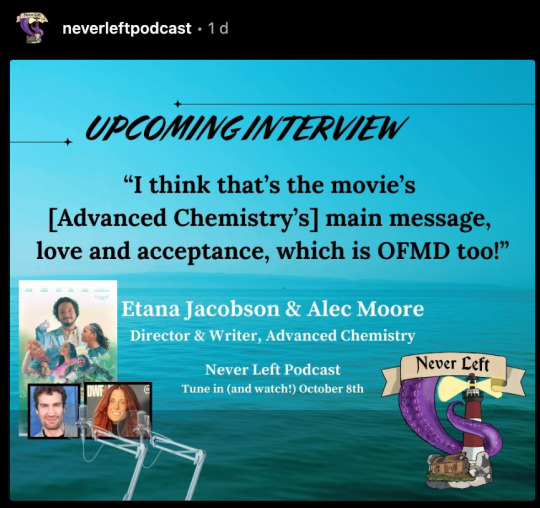
Source: Never Left Podcast Instagram
= Gay Pirate News Hour =
Another episode of Gay Pirate News Hour is back Oct 5, 2024 1pm Pacific, 4PM Eastern on Youtube! Hosted by Our Flag Means Fanfiction, and joining are @ringasunn and IreneAdler. So excited for the next episode! (One of these days my life will calm down and I might get to join them). Check it out on OFMFF Youtube!
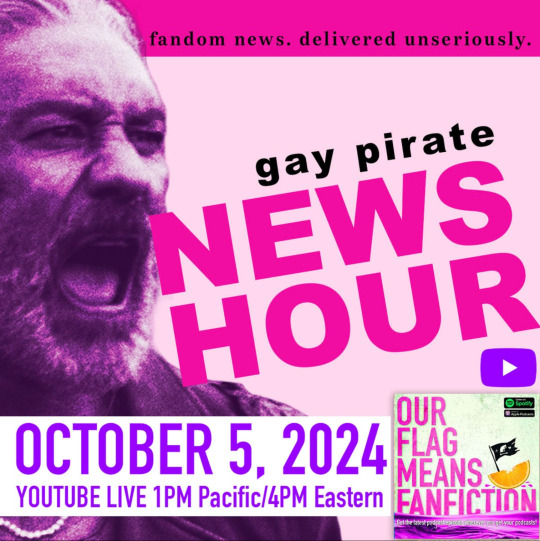
Source: Our Flag Means Fanfiction
== Love Notes ==
Happy Friday Lovelies! I realize this recap is for weds and thursday but I'm gonna roll with it! I hope the rest of the week was kinder to you than the previous parts of the week. Please know we're thinking of you crew, it's okay if you're keeping low on the radar of fandom at the moment. It's also great if you're out honking your nose off! Whatever you're doing is what you need to do, and don't let anyone tell you any different. I know sometimes it seems like things just keep getting worse, lovelies, the world is a chaotic place, and it's okay to sit with your feelings and feel that. Just remember you're loved and it can and will get better one day. There will always be high points and low points in this life, that's just how it goes, but how you cope with those points changes for the better each and every time they pass. Remember you are wonderful, and you are strong, and you're gonna get through whatever you're dealing with, okay? Sending love and hugs, and all the good vibes into your weekend <3
instagram
Source: Anxiety.Positive Instagram
#daily ofmd recap#ofmd daily recap#rhys darby#taika waititi#conan o brian#david jenkins#kristian nairn#vico ortiz#anapela polataivao#david fane#lindsey cantrell#lube as a crew#adopt our crew#dominic burgess#ofmd daily recaps#save ofmd#our flag means death#ofmd#samba schutte#rachel house#te maunga#never left podcast#gay pirate news hour#Instagram
41 notes
·
View notes
Note
Which best describes how you feel about the term Latinx when referring to Latin Americans in general?
It's a slur
It's unnecessary, I would just use Latino
I would rather use Latine
It's ignorant toward the Spanish language, only English speakers would use it
It is the most accurate and inclusive term
It's been taken out of context and only applies to GNC, enby, queer, etc Latin Americans
It's fine, but I'd avoid using it if possible
I don't care
I don't know
#problematic polls#polls#tumblr polls#my polls#random polls#poll time#random poll#anonymous#anons poll#incognito polls#poll blog#poll game
24 notes
·
View notes
Text
Sylvia Rivera: Herstory

The history of LGBTQ activism in New York City made substantial strides on the backs of people of color, specifically Black and Latinx trans women, from the community. There were figures that were born from this time, most famously Marsha P. Johnson and Sylvia Rivera, a Latina trans woman who fought beside her. I believe that Sylvia Rivera is an important figure to know when thinking about the history of queer and trans activism. She stood for inclusivity and recognized intersectionality within the community at a time where that was not at the forefront of change for gay activists groups like Gay Liberation Front. Through this essay, I will be highlighting her legacy as an activist, including her early life, movements she was associated with, and activist groups that were formed by her and carried on past her lifetime.
Sylvia Rivera was born on July 2, 1951 in Bronx, New York City to a Puerto Rican father and a Venezuelan mother. Her childhood was troubled in the sense that she lost both of her parents at a young age. Her father abandoned her after her birth and was orphaned at the age of three after her mother committed suicide. She was sent to live with her grandmother, who physically abused her for her effeminate behavior. This caused her to run away from home at the age of eleven to the city, where she became a child prostitute working in the Times Square area. This was the reality for many homeless, queer youth during this time. While living on the streets of New York, she met a group of drag queens, who welcomed her with open arms and became her support system into her transition as Syliva. In her early years, she considered herself to be a drag queen but later in life, she described herself as a trans woman. (11)
The Stonewall Riots, also known as the Stonewall Uprising, is noted as a motivating force for LBGTQ political activism, which led to many gay rights organizations forming. The event was located at the Stonewall Inn, a gay bar in Greenwich Village that was owned by the Genovese crime family, who bribed the police to ignore the activities occurring within the club. They went as far as blackmailing the club’s wealthier patrons to keep their sexuality a secret. The conditions of the Stonewall Inn were deplorable: lacking a fire exit, no running water in the building, and the toilets were not clean. The uprising began there at the early hours of June 28, 2024. This started with the Public Morals Squad of the NYPD conducting a raid with the excuse of cracking down on “illegal” activity and prostitution. They were roughing up patrons, finding bootlegged alcohol and they arrested 13 people, “including employees and people violating the state’s gender-appropriate clothing statute (female officers would take suspected cross-dressing patrons into the bathroom to check their sex)” (12). In response, the people fought back, including Sylvia Rivera and her fellow friend Marsha P. Johnson. They were rioting and protesting in the streets, calling for an end of the criminalization of their lifestyles as queer people. That night, Rivera is quoted for telling her lover, “I’m not missing a minute of this. It’s the revolution!” (7).
In the 1970’s, Rivera joined the Gay Liberation Front and the Gay Activist Alliance. The Gay Liberation Front was a militant group of radical and revolutionary gay men and women committed to fight the oppression of gay people as a minority group and to order the right to self-determination of their own bodies. The Gay Liberation Front had a newsletter titled Gay Flames. In their fourth issue (1970), they observed that the organization, “is trying to build an alternative to the bars/baths/cruising scene which has become a way of life for so many homosexuals, particularly homosexual males. Gay night at Alternate U. is part of that effort.” They hosted Friday night classes at Alternate U., “listed in the publication included medical, legal, demonstration, gay squatters, racism, gay history and literature, sexism, exploration of roles and identity, and Marxism and political workshop” (8). Additionally, the coalition produced New York’s second gay newspaper, COME OUT!, from November 15, 1969 until the winter of 1972.
She was advocating for nondiscrimination ordinances for housing and employment in New York City. She was an outlier in the movement because of her identity as a Latina trans woman. The movement’s agenda was not aiming to benefit people of color in the community. This is due to the majority of the activist groups mainly being gay white men. She was also shunned by lesbian feminists during this time, who viewed her identity as a trans woman as caricatures of womanhood from a sexist perspective (10).
When I was researching more about her association with the Gay Liberation Front, I discovered a speech of hers on YouTube. It was titled the, “Y’all better quiet down” speech, which was a recording of her delivering this passionate speech at the Christopher Street Liberation Day Rally in Washington Square Park. Immediately when Rivera came onto the stage, the reaction from the crowd was echoing with ‘boos' and she came back with rage in her voice. She was angered by their lack of inclusion as a movement, referring to their fear of "stepping on tails'' and ‘backroom deals’ that were being led by gay middle-class white men as well as white lesbians who didn’t understand nor shared her passion for marginalized groups within the gay community (transgender, gender non-comforming, etc.). She was directly pointing out the physical and sexual violence enacted on transgender people in jail, including her own personal experiences with it (5).
As a viewer, this speech was impactful from her delivery along with her ability to command an audience to listen to her, despite the lack of support from the organization. I feel like a lot of points she made are issues that are still happening today: there are still substantial amounts of queer/trans youth of color that are getting kicked out of their homes from their disapproving families. Trans people, specifically trans women of color, have been verbally, physically, and sexually assaulted, and even worse, being murdered for simply existing.
Her feelings towards the injustice of queers/trans people of color motivated her and Marsha P. Johnson to start their own activist group: S.T.A.R., the Street Transgender Action Revolutionaries. Formerly known as the Street Transvestite Action Revolutionaries, the group was created in 1970, after a sit-in at Weinstein Hall in New York University. The protest at NYU erupted after the administration canceled planned dances there, reportedly because a gay organization was sponsoring the events. The Gay Liberation Front and other activist groups held the sit-in, which ended with them winning the right to use the venue for their dances. After this, Rivera shifted gears and joined forces with Marsha P. Johnson to create S.T.A.R. They are known for being a militant group and youth shelter for homeless trans youth. This was important for both Rivera and Marsha P. Johnson because of their experiences of homelessness as trans youth. They made it a priority to recognize intersectionality within the LGBT community and practiced inclusivity within their group, unlike the Gay Liberation Front. (1)
What really stuck with me when reading more about the history of S.T.A.R. was the importance of having a home. “STAR was for the street gay people, the street homeless people, and anybody that needed help at the time,” Rivera said. As a group, they struggled to find shelter in New York City. They snuck multiple people into hotel rooms, “Marsha and I had always sneaked people into our hotel rooms. And you can sneak 50 people into two hotel rooms.” In the group’s first home, a parked trailer truck in a Greenwich Village outdoor parking lot, they had over two dozen trans youth living together. One day, Rivera and Marsha P. Johnson found a truck driving away from the trailer with about twenty people inside sleeping, with one person on their way to California. They wanted to grow in a more permanent home without the control of the Mafia, so they decided to land with a home at 213 Second Avenue in the city. Rivera said, “We fed people and clothed people. We kept the building going. We went out and hustled the streets. We paid the rent. We didn’t want the kids out in the streets hustling. They would go out and rip off food. There was always food in the house and everyone had fun. Later we had a chapter in New York, one in Chicago, one in California and England. It lasted for two or three years” (3). The fact that Rivera and Marsha P. Johnson did not have the financial standing that could comfortably support 50 people yet they made it their priority to make it work with what they got is a beautiful thing to hear.
Rivera met the Young Lords Party in the fall of 1970, during a mass demonstration that started in East Harlem. They were protesting against the police’s repression and STAR decided to join the demonstration with their banner. This was one of the first times the STAR banner was shown in public and was present as a group. “I ended up meeting some of the Young Lords that day. I became one of them. Any time they needed any help, I was always there for the Young Lords. It was just the respect they gave us as human beings. They gave us a lot of respect. It was a fabulous feeling for me to be myself—being part of the Young Lords as a drag queen—and my organization [STAR] being part of the Young Lords.” She also made an association with Huey Newton, leader of the Black Panther Party in 1971. “Huey decided we were part of the revolution—that we were revolutionary people,” Rivera said (3). These associations of hers are an example of practicing what you preach; she created connections with other organizations that stood for the rights of Puerto Ricans and African Americans, in which many quuer/trans youth in STAR identified with. They recognized intersectionality and practiced inclusivity within their organization, creating a safe space and a home for queer/trans youth in need of protection, support and guidance.
What transpired almost three decades of activism for Rivera was the Sylvia Rivera Law Project in 2002. The purpose of the project is to provide much-needed legal services for those who cannot afford representation, as well as use training public education, policy reform, and precedent-setting lawsuits to end state-sanctioned and institutional discrimination, violence, and coercion on the basis of gender identity and expression in relation to race and class. Due to Sylvia’s passing in the same year, they are continuing Rivera’s lifelong work as a trans person of color by working to ensure a stable and safe experience for transgender, intersex, and gender nonconforming people. They are centralizing issues of systemic poverty and racism, and prioritizing the struggles of queer and trans people who face the most severe and multi-faceted discrimination. They have a website that highlights their approaches and principles as an organization, which is very extensive and is typed up in both English and Spanish translation. This feature is subtle in its inclusivity, allowing a larger audience to connect with and potentially join or volunteer for the project (6).
Thinking about Sylvia Rivera in relation to the readings that were exposed to me during the course of the semester, discussions about the transgender experience has informed me more to understand her better. I believe that the critiques of the film, Paris is Burning, both bell hooks’ “Is Paris Burning?” and Judith Butler’s “Gender is Burning”, along with C. Riley Snorton’s “A New Hope” could be applied to the principals that Rivera practiced in her activist career. The film Paris is Burning was released in 1990, where we were given a glance into the ballroom scene in New York City. This film was directed by Jennie Livingston, a white lesbian who had the means to come into this community and make a spectacle out of the tragedies of trans women of color. This aspect is something that both hooks and Butler discuss in their writing, Butler cites hooks in their writing but also ties in their perspective.
hooks states that Livingston is a white lesbian that although her physical presence in the film is not there, her position and perspective as a white woman/lesbian filmmaker shapes and forms the standpoint of the film. hooks states that Livingston does not resist the notion that “hegemonic whiteness “represents” blackness, but rather assumes an imperial overseeing position that is in no way progressive or counter-hegemonic” (151). This “privileged location of innocence” that Livingston possesses is something that Rivera was fighting against in her activism, especially in the “Y’all Better Be Quiet” speech. She was actively boo-ed for being a trans woman of color speaking against the whiteness of the Gay Liberation Front; a movement that was run by white, cisgender gay men and lesbians who dismissed the struggles that trans women of color were facing at that time (4).
Butler points this out as well, calling Livingston’s camera as “the promise of phantasmatic fulfillment” for the trans women of color that were in the film. Livingston as “the white girl with the camera” is both the object and vehicle of desire as white woman but as a lesbian, she sustained “some kind of identificatory bond with the gay men in the film” (391). They go on to state that Livingston incites trans women of color on the screen to become a woman before her camera and in doing so, she has the ability to bestow femininity and womanhood onto trans women of color. This is because of her position in society, where whiteness and wealthiness are considered the “peak” identity, at the top of the societal chain and the class ranking. I find both bell hooks’ and Judith Butler’s takes to be interesting ways to analyze the dynamic between both Livingston and trans women of color like Octavia St. Laurent, as well as Sylvia Rivera and the Gay Liberation Front (2).
Snorton’s “A New Hope” speaks more about the relationship between hope and desire being “intimately linked” together. This is in reference to the hope of passing as a trans person but I would like to consider this concept to be applied to the hope that Sylvia Rivera had for LGBTQ activism throughout her career. Snorton writes that the “meanings of hope and desire may overlap when the length of time is short or hope can become a passive counterpart to desire when the duration of time is indefinite… hope lies in an aspirational future that implicates individual practice in the present… hope can cast the present in a historical light.” I believe that this thinking could relate to how the hope of inclusivity and practicing intersectionality for the movement lies in the aspirations for the future of the LGBTQ community/rights movement, which implicated Sylvia Rivera to practice in her present time and is carried through people a part of the Sylvia Rivera Law Project that is still active today (9).
From learning about Sylvia Rivera, there are a lot of things that you can take away from learning about her life as an activist and pioneer in the LGBTQ rights movement. She fought for her beliefs in inclusion and intersectionality while associated with an organization that did not support those beliefs. Because of this, started the group STAR, the Street Transgender Action Revolutionaries with her friend Marsha P. Johnson to serve the large population of homeless queer and trans youth of color. Despite the struggle to find a building to provide shelter for them, they eventually settled in 213 Second Avenue. STAR was able to establish associations with the Young Lords Party and the Black Panther Party, which reflected the organization’s core principles. Jumping to three decades later, she continues to practice her activism through the Sylvia Rivera Law Project, which is inclusive to Spanish speakers on their website. She would continue to come outside to protest until her passing in 2002, the same year her project was created. Considering the readings we familiarize ourselves with this semester, I was able to connect the thoughts/concepts of bell hooks, Judith Butler, and C. Riley Snorton discussed in their writings. I will carry the knowledge of her legacy in my mind, and I hope that her legacy lives on through her project’s people.
sources:
“An Army of Lovers Cannot Lose: The Occupation of NYU’s Weinstein Hall.” Researching Greenwich Village History, WordPress, 23 Feb. 2012, greenwichvillagehistory.wordpress.com/2011/12/14/an-army-of-lovers-cannot-lose-the-occupation-of-nyus-weinstein-hall/.
Butler, Judith. Bodies That Matter : On the Discursive Limits of “Sex.” Routledge, 2011.
Feinberg, Leslie. “Street Transvestite Action Revolutionaries- Lavender & Red, Part 73.” Street Transvestite Action Revolutionaries, Workers World, 24 Sept. 2006, www.workers.org/2006/us/lavender-red-73/.
hooks, bell. Black Looks : Race and Representation. Routledge, 2015.
“L020A Sylvia Rivera, ‘Y’all Better Quiet down’ Original Authorized Video, 1973 Gay Pride Rally NYC.” YouTube, 23 May 2019, youtu.be/Jb-JIOWUw1o?si=jY94H5fnzTSvx-8e.
“Our Approach and Principles/Nuestras Práctica y Principios.” SRLP (Sylvia Rivera Law Project), Sylvia Rivera Law Project, 11 Feb. 2018, srlp.org/about/principles/.
Rothberg, Emma. “Sylvia Rivera.” National Women’s History Museum, 2021.
Shockley, Jay. “Gay Liberation Front at Alternate U.” NYC LGBT Historic Sites Project, National Women’s History Museum, May 2017, www.nyclgbtsites.org/site/gay-liberation-front-at-alternate-u/.
SNORTON, C. RILEY. “‘A New Hope’: The Psychic Life of Passing.” Hypatia, vol. 24, no. 3, 2009, pp. 77–92, https://doi.org/10.1111/j.1527-2001.2009.01046.x.
“Sylvia Rivera: Pushing Boundaries: Taína Caragol.” YouTube, 20 Nov. 2020, youtu.be/0ODJ5gNcGho?si=rvbUfY4wnTU1DTK1.
“Sylvia Rivera - Speech, Stonewall & Death.” Sylvia Rivera , Biography, 4 June 2019, www.biography.com/activists/sylvia-rivera.
“1969 Stonewall Riots - Origins, Timeline & Leaders.” History.Com, A&E Television Networks, 31 May 2017, www.history.com/topics/gay-rights/the-stonewall-riots.
link to powerpoint:
#sylvia rivera#lgbtqia#lgbtq community#lgbt pride#gay liberation#stone wall#queer rights#trans#pride
17 notes
·
View notes
Note
Hello. Sensitive question here but I wanted to ask since you stated you are from the U.S. as well. Is it now common to place an x to "neutralize" the gender of all encompassing nouns? I read a volunteer post on social media stating Hijxs and niñxs and threw me for a loop because the grammar is hijos and niños for children in general (boys and girls), right? Is this a lexicon change or just a U.S. thing?
It's just a US thing for the most part - many Latin Americans and even Spaniards see the X as an American thing
(The history is more nuanced but my sources say it came from the queer/drag community in Brazil of all places, but people would spray paint an X on gendered signs especially when "masculine plural is default inclusive" became a viewpoint)
...
The real problem with using X (aside from general perception of Latinx being a US-Hispanic thing) is that it's hard to pronounce and not great for accessibility
It makes more sense in reading it and written down, not so much speaking. People still do it in written things. When I was growing up before the Latinx movement people would use the @ (arroba) because it was part A part O... so we used to see like ¿tienes much@s amig@s? for "do you have a lot of friends?" and it was implied any gender. It's less common now because the @ often brings up social media stuff
-
The most widely accepted gender neutral is the use of -E endings; many unisex adjectives use -E [like inteligente or valiente] and it appeals more to pan-Hispanic sensibilities because E looks more Latin
And people like the E more because they see it as more organic to Spanish and less of a US-driven movement
I wrote more about the use of E in some posts related to Baldur's Gate 3:
This post here
And this larger post here
Note: Also the E can be used with Spaniards or Spanish-American people; "Latinx" specifically refers to Latin Americans, and the X is not very often used with Spaniards in my limited experience [though español/española doesn't go very well with the X in my opinion]... the E is more universally applicable
I've seen Spaniards use vosotres for "all of you [informal]" with a gender neutral twist
...
Me personally I tend to see Latinx as referring to people of Latin American descent living in the US. It's more commonly seen for talking about writers and artists of Latin American descent, and especially in the art scene to differentiate them from white artists while also not lumping them into everyone who's a person of color... since Latin Americans come in every color and shade and it's not technically a race
It's more commonly seen and used around New York, Los Angeles, Chicago, and Miami (I personally tend to associate it more with Mexican-Americans but that might be from reading about the Chicano/Chicanx art/literature movements)
54 notes
·
View notes
Text
I like how the world is becoming more inclusive for non-binary and other queer folk with genders outside of male/female, but what’s the big deal with slapping an X at the end of a word to make it gender neutral? I refuse to have an opinion on “Latinx” (that’s for Spanish speakers to decide) but what the fuck is the deal with “folx?” Folks is already a gender neutral word! Why are you trying to rebrand it with an X? Are you Elon Musk?
12 notes
·
View notes
Text
Origins of Healing Justice - Conjuring the Roots of Healing Justice
The legacies of settler colonial dispossession from land, slavery, and colonization led assimilation makes it difficult to follow our lineages and learn about our inherited cultural ceremonies, knowledge, and resistance practices. Healing justice is conjured into our world through reconnection with our individual lineages to inform how our individual practices can help us heal or transmute intergenerational trauma into fuel to keep our movements strong and resilient. Healing intergenerational trauma and the unique traumas of our intersections of oppression require cultural techniques to fulfill the soul memory of our traditions that were passed down for generations. A quote from Mya Hunter of SpiritHouse NC states, “The theory of change for us is around Culture, Practice, and Ritual, and we call it ‘CPR’. And so everything has to be based in your personal culture,” pg 130. Part of my healing and reconnection journey has been reading The Curanderx Toolkit: Reclaiming Ancestral Latinx Plant Medicine and Rituals for Healing by Atava Garcia Swiecicki and other books about Curanderismo to inform my individual practice. I have been combining the knowledge I was able to pick up from my great grandmother who was a Curandera before dementia took over and she passed away, and the things I’ve learned in alignment with my core through exploration of related books. The Curanderx Toolkit is a very queer-inclusive and gentle approach to our traditions that acknowledges the roots of our practices that came from Indigenous, African, and Catholic traditions.
22 notes
·
View notes
Note
I was wondering what are you most excited to teach about? Like is there a specific topic your looking forward to if you don’t mind me asking? 🤔
-🧀
I am studying support/social networks for marginalized individuals and how they develop those in environments that lack those networks, infrastructure, or are in complete hostile environments. The point is to see how support networks are built and sometimes formalized into actual organizations with the intent of helping people built those organizations, or look for ways to improve current organizations to be more diverse/inclusive or meet the needs of their population more efficiently.
I'd like to teach about Latinx histories in general, though if possible to focus queer Latinos throughout history. And to teach about sociocultural anthropology and introduce new student to the field! It be nice :)
7 notes
·
View notes
Note
https://www.lgbtqnation.com/2024/10/latino-voters-are-more-likely-to-oppose-politicians-who-use-the-term-latinx/
2 notes
·
View notes
Text



https://x.com/skeprescenter/status/1836150166577172937
Americans Vastly Overestimate How Many Hispanics Identify as "Latinx"
Academic jargon tends to leak out into public discourse regardless of its evidentiary basis.
For example, the term Latinx is still not popular among Hispanics even though many people think it is.
Have you heard of the term “Latinx”? The Pew Research Center recently released an updated report showing that only 4% of Hispanics identify with the term. In fact, 75% of Hispanics that had heard of the term told the Pew Research Center that it should not be used to describe the Hispanic or Latino population.

[ Source. ]
In a survey we conducted with over 3,000 Americans we asked people to guess the rate at which Hispanic Americans identify with the term "Latinx" (and plotted the actual % in red). See our results below.
Regardless of political ideology and age, Americans overestimated the rate at which Hispanic Americans identify with the term by an extraordinary degree (younger and liberal Americans had the most incorrect estimates).


Why does this matter and why are people so wrong?
In some academic circles this label is considered morally necessary and widely used. For example, around 2019, the American Psychological Association changed the name of the “Journal of Latina/o Psychology” to the “Journal of Latinx Psychology.” The term "Latinx" was unknown until around 2004, when it was introduced by "queer communities on the internet who favored a non-binaristic gender-inclusive term." A typical, possibly nonsensical, justification given by academics looks like this: the UNC professor María DeGuzmán argues that "Latinx" is urgently needed and becoming more popular among Hispanics because the "civil rights movement... is being dismantled... the public sphere is being starved of resources and infrastructures by an authoritarian, hyper-capitalist order, and [because] so much life, human and nonhuman (flora and fauna), is eroding, collapsing, vanishing (unnaturally)," [1].
What do you think?
[1] DeGuzmán, M. (2017). Latinx:¡ Estamos aquí!, or being “Latinx” at UNC-chapel hill. Cultural dynamics, 29(3), 214-230.
==

"Latinx" is colonialism.
Same vibe:


"Would you please change the Spanish language to make me more comfortable?"
#Skeptic Research Center Team#latinx#latino#latina#Spanish#romance languages#gendered language#religion is a mental illness
6 notes
·
View notes
Note
What's wrong with Latinx?:( I don't like being called latina/o because it sounds too gendered
there’s nothing wrong with latine individuals themselves using/identifying with it, necessarily! it’s down to personal choice, kind of like with queer identities. the issue is more the use of it by largely white corporations/figureheads with no regard for the actual struggles of the community and are only using it for inclusivity points (see: disney).
the real biggest issue with latinx is that it wasn’t made for latine languages. you can’t easily say it out loud in any language really. it works pretty okay for physical texts, but in communication, it’s clunky and stilted. latine is preferred because it follows more closely with the original languages, without the awkwardness of trying to add x to the end of it
31 notes
·
View notes
Note
Heyo Yumi! I was wondering why u don't like the pronoun iel? Is it just a preference, or are there political or linguistic reasons u dont like it? xx
oh it's like, i'm a bit of a stickler for grammar and all ? like french is a Heavily gendered language
(rn there's kind efforts to neuter (? make it more neutral) it a bit by adding -x at the end of adjectives and stuff for more inclusivity (like if you say "hello to all" the policy at my university is to say "bonjour à tous-te-x") which i find kinda artificial and i don't like it)
anyway the thing is that i just don't know how to conjugate adjectives and stuff with iel, and i don't like the -x option. is basically it
idk a lot of it feels like cis folks trying to get inclusivity points and maybe that's not the case, it probably isn't, but it's like. idk in the climate at my college it really feels off, kinda like folks using latinx instead of latine, or like the folx thing a little while back
guess i'm having more thoughts about this than i expected haha
when i decided not to use iel (when the question first came up with my mom) it was really about the grammar thing, but i guess the college policy and the way it's used rn kinda weirded me out a bit
but yea, it's mostly just a preference. i'm actually not at all in touch with the queer community in my area so if there's any other (actually good) reason i do not know it lmao
4 notes
·
View notes
Text
One of the things I like about my work are the employee relations groups. I co-lead the Pride and Allies group with my boss and we're both genderqueer little weirdos with pet rabbits.
We had our monthly Pride Coffee Chat today that I ran with the topic of surviving the holidays and it went really great. I was worried about engagement, but after the first few minutes the conversation really got going and went over time.
We also have a monthly queer book club and I'm excited for 2024 for more fun events. In the past we've had a Halloween chat, partnered with the Latinx group for Hispanic Heritage Month on a joint trivia game, a gender inclusivity in the workplace discussion, LGBT trivia games, LGBT in tech talk, back to school event. I know we're working with the Green Environment group on a joint event soon and I'm really excited. And I'm excited for some of the changes I got done in the office like getting pronouns added to profiles in Teams. I love community and so excited for next year
4 notes
·
View notes
Text
Coming Out
One of the things I wanted to do with this comic book is make it inclusive and a place for underrepresented persons of color, gender and sexual preference to have representation.
The story, while not autobiographical, draws heavily from my personal belief and experiences.
As such, one of the biggest surprises in writing this has been my own personal identity. You see I’ve always struggled fitting in, alway felt outside the norm. Whether that was in school as one of the few LatinX kids who spoke Spanish and ate “weird” food, or within my own community because I was too “whitewashed” to fit in.
But there was more to it. I loved the opposite gender, I wanted to date them, but I also felt jealousy of how beautiful they got to be and got to dress and be free to express their femininity. Deep down inside I wanted to be a part of that. I didn’t fit the stereotype of other boys, especially traditional LatinX boys. Especially with an immigrant family from Mexico. I wasn’t “macho” enough, but that was pretty much the same with the male culture of the United States.
Thanks to the encouragement of my wife, I have felt it time to come out and express my gender fluidity. What does that mean? It means I’m queer. It means I sometimes feel more feminine than male and have always struggled to let that out but never allowed it. Well, not anymore, like Lynx who is allowing herself to discover she is gay, I’m allowing myself the chance to discover what my gender expression is and how it fits into my life.
I’m still me, but I’m also me and more now. Just like my characters who move through life figuring out their identity as a woman, person of color, religion, gender and sexual preference, etc. I am with them on that journey trying to figure me out.
0 notes